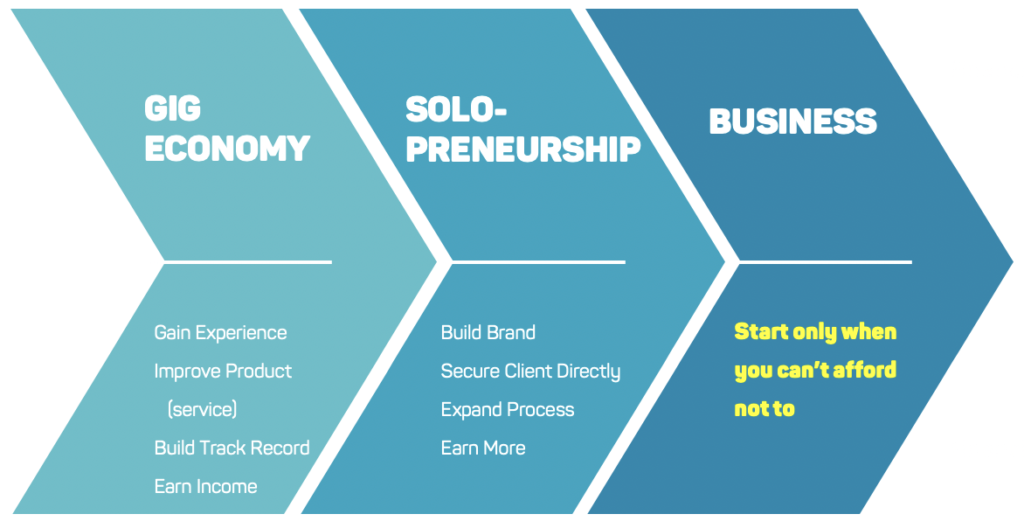
START A BUSINESS – BUT DON’T BURN THE SHIPS
According to legend, when Captain Hernan Cortes landed in Veracruz in 1519, he burned all his ships so that his army would have no option for retreat. Startlingly, people starting businesses are often given this same advice. They are advised to “burn the ships” by killing all other possibilities and earning opportunities in favor of unwavering and focused commitment to making things work with their new business no matter what. Retreat and failure are easy when they are an option, so simply take those options off the table. I cannot summon strong enough words to express what truly terrible advice this is for most people.
For an extremely small group of people with off-the-charts good alignment, timing, and luck, this path can sometimes work. Stories of such paths are the basis of books and movies glorifying the starving-entrepreneurs-turned-titans-of-industry. For the rest of us, ranging from beginners to advanced entrepreneurs with successful business sales under their belts, this path is unattractive, unnecessarily difficult, and incredibly dangerous.
Business startups are almost always born in environments where there is a scarcity of time, resources, and money. Burning the ships means you won’t be making more money other ways to buy yourself more time to succeed. This added pressure of having to succeed in record time – with no backups or extra resources – can cause a business to crumble by itself. The research clearly shows that people perform at statistically significantly higher levels when stress levels are in reasonable to tolerable ranges (Chong, Falahat, & Lee, 2019).
As a minimum starting point, an entrepreneur must create the conditions optimal for personal performance in order to give his or her business the highest probability of success and growth. Putting an unnecessary clock on business success and profitability is like strapping weights to a swimmer. Sure, they might make it anyway – but why increase the risk of drowning? There are no prizes for overcoming the hardest obstacles to success.
But even more than that, building your team, product, process, and customer base before committing your entire self to the venture is the equivalent of entering a car race with a rolling start. If the car (or business) is not only built, but it is started and catching speed before the driver crosses the starting line, then success is much more probable. Problems and performance issues have likely been identified in the process leading up to the race, and the car and driver are ready to go and have momentum. It does not guarantee the race will be won, but it does increase the likelihood.
Building your business slowly while earning money other ways is not only a more achievable path for avoiding failure and building a successful business, it is the more prevalent and proven one. If a successful business is a function of a team, validated product, and proven process and fueled by paying customers, all are attainable before going “all in.” Furthermore, doing so while enjoying income from supplemental roles in the Modern Economy (link back to the other paper) offers the entrepreneur the space to perform and the time to gain traction, both of which are incredibly hard to pinpoint in terms of timing. Consider Juan and Brad. They both wanted to start web design businesses:
- Juan started slow, taking freelance web design jobs in the evenings after work. He refined his portfolio, learned new skills, and figured out what his target customers are looking for in a web designer. He kept building his client base until he could afford to go part time with his regular job. Then he kept doing that while he started direct marketing for new clients and setting up his business. Fast forward three years, and Juan and his team of two web designers and an office manager all work full time for Websites by Juan.
- Brad went all in on day one. He quit his job, and started building himself an elaborate web presence. As a “real business,” he didn’t want to waste any time on gig work boards. Instead, he spent all day on social media and cold emailing potential clients. Six months later, Brad ran out of money. He never got more than one or two small jobs. His stress is through the roof. He ends up begging for his old job back before the first year is out.
One of the top reasons businesses fail is because they run out of money (Mungal & Garbharran, 2014). One of the big differences between Brad and Juan is that Brad ran out of money after six months, and Juan could have kept trying forever. Juan was working The Biz Startup Pathway™. The Biz Startup Pathway™ offers entrepreneurs sharply lower risks, a more sustainable path, and extremely easy onramps for even the least experienced entrepreneurs to sharpen their product (or service) and themselves. The Biz Startup Pathway™ looks like this:

At each stage, the team (if applicable), product and process are all developed, tested, and improved. Skills and competencies are built, and revenue is generated and grown – as is the customer base. One does not move to the next stage until the current one is optimized and opportunities for growth reach their limits. One only advances to being fully committed to a business when not doing so no longer makes sense.
The Biz Startup Pathway™ not only offers entrepreneurs low risk approach to building a company from scratch, but it can be started without any experience and in literally one hour. Secure a gig for an hour (or a day or a week) and build from there with clear pathways and milestones. Do so at the pace that the business affords and the entrepreneur can meet.
Contrary to popular opinion, entrepreneurs don’t take unnecessary risks. They underwrite all risks and proceed with clear intention. It may not be what books and movies depict, but it is how some of the most successful businesses have come to pass.
Chong, S., Falahat, M., & Lee, Y. (2019, November 13). Emotional Intelligence and Job Performance of Academicians in Malaysia. Retrieved from International Journal of Higher Education: https://files.eric.ed.gov/fulltext/EJ1234696.pdf
Mungal, A., & Garbharran, H. (2014, December). Cash Management Challenges of Small Businesses in a Developing Community. Retrieved from Mediterranean Journal of Social Sciences: http://dev-ir.dut.ac.za/bitstream/10321/1590/1/Mungal_MJSS_Vol5N27_2014.pdf

